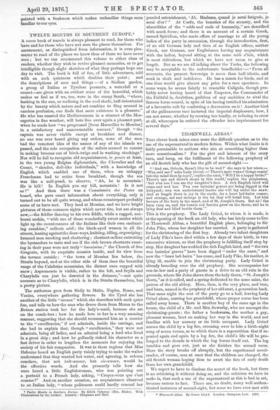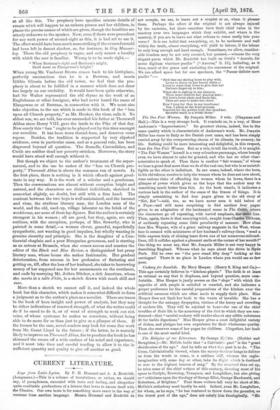TIIORNWELL ABBAS.*
THIS clever book raises once more the difficult question as to the use of the supernatural in modern fiction. Within what limits is it fairly permissible to authors who aim at something higher than mere sensationalism ? For the plot and interest of the story turn, and hang, on the fulfilment of the following prophecy of an old Scotch lady who has the gift of second-sight And sae, Grizzle' thour't like to be wed ?' she says to her niece.— 'Win said sae?' asks Lady Grizel.—' There's mair ways o' things comin' into the mind than by sayinV replies the aunt," Will I be a happy bride ?" There's ups and there's doons in this warld,' replies the prophetess, 'but e'en noo I can see thy daughter's face. A rich English laird will come and wed her. Twa wee bairnies' graves are being digged in the kirkyard ; twa wee unchristened lassies she will lay under the snaw. And at length there is joy in the castle, for a brew lad-bairn comes - and strange, sad and strange is the lot that will befall him. Let him
i beware of the burn in the mead, and of St. Joseph's thorn. But ah ! the burn runs on, and the bonnie red berries grow on the thorn, and he is lying deaf and blind beside them."
This is the prophecy. The Lady Grizel, to whom it is made, is at the opening of the book an old lady, who has lately come to live at Thornwell Abbas, a beautiful English place, belonging to Sir John Pike, whom her daughter has married. A party is gathered for the christening of the first boy. Already two infant daughters of Lady Pike's have died within a few days of their birth, in two successive winters, so that the prophecy is fulfilling itself step by step. Her daughter has wedded the rich English laird, and "the twa wee bairnies' graves" have been digged "under the snaw," and now the "brim lad-bairn "has come, and Lady Pike, his mother, is lying ill, unable to join the christening party. Lady Grizel is already brooding over the old prophecy. She accompanies her son-in-law and a party of guests in a drive to an old ruin in the grounds, where Sir John shows them the holy thorn, "St. Joseph's thorn," as it is called, and a spring dedicated to the same saint, the patron of the old abbey. Here, then, is the very place, and tree, and burn, named in the prophecy of her old aunt, a generation back. That same night the rest of the party go to a ball, leaving Lady Grizel alone, nursing her grandchild, whose proper nurse has been called away home. There is another boy of the same age in the house, the child of a Mr. and Mrs. Sowerby, who are amongst the christening-guests ; the father a bookworm, the mother a gay, pleasant woman, bent on making her way in the world, and not familiar with her nursery or its little occupant. Lady Grizel nurses the child by a log fire, crooning over to him a birth-night song of seven verses, as to which there is a superstition that if re- peated again and again by a log fire, the child's life will be pro- longed to the decade in which the log burns itself out. The log tumbles and goes out, just as she finishes the second verse. Here the story breaks off abruptly, but the experienced novel- reader, of course, sees at once that the children are changed, the old Scotch woman hoping thus to avert the fate of early death from her own grandchild.
We regret to have to disclose the secret of the book, but there is no criticising it without doing so, and the criticism we have to make is, that such a use of the supernatural as this is bad in art, because untrue to fact. There are, no doubt, many well authen- ticated instances of second-sight, but none we have ever met with Thorntrell Abbas. By Grant Lloyd. London: Sampson Low. 1876. at all like this. The prophecy here specifies minute details of events which will happen to an unborn person and her children, in places the precise names of which are given, though the localities are utterly unknown to the speaker. Now, even if there were precedent for any such power of second-sight as this, it is bad art to use it. The effect would have been much more striking if the events foretold had been left in decent shadow, as, for instance, in Guy Manner- ing. There the old prophecy is vague, and only names a locality with which the seer is familiar. Wrong is to be made right,— " When Bertram's right and Bertram's might,
Shall meet on Elangowan's height."
When young Mr. Vanbeest Brown comes back to his birthplace, perfectly unconscious that he is a Bertram, and meets Gibbie Glossin before the old tower, we feel that the pro- phecy is about to be fulfilled in a manner which does not draw too largely on our credulity. It would have been quite otherwise, had Sir Walter represented the old rhyme as the work of an Englishman or other foreigner, who had never heard the name of Elangowan or of Bertram, in connection with it. We must also take objection to the use which is made in this book of the "ban upon all Church property," as Mr. Hooker, the vicar, calls it. No eldest son, we are told, has ever succeeded his father at Thornwell Abbas since Henry VIII. gave the lands to the Pike of that day. Now surely this "ban " ought to be played out by this time amongst our novelists. It has been worn thread-bare, and deserves some repose. Besides, the tradition is supported by very slipshod evidence, even in particular cases, and as a general rule, has been disproved beyond all question. The Russells, Cavendishes, and Cecils are neither dead nor poverty-stricken. Moreover, the story would have stood well enough without it.
But though we object to the author's treatment of the super- natural, and to the use he makes of the "ban on Church pro- perty," Thorn well Abbas is above the common run of novels. In the first place, there is nothing in it which offends against good- taste in any way. It is the work of a scholar and a gentleman. Then the conversations are almost 'without exception bright and natural, and the characters are distinct individuals, sketched in somewhat slightly, no doubt, but still with a firm hand. The contrast between the two boys is well maintained, and the baronet and vicar, the studious literary man, the London man of the world, and the old, used-up, village labourer on the brink of the workhouse, are none of them lay-figures. But the author is certainly strongest in his women ; all are good, but they, again, are only outlines, with the exception, perhaps, of Mrs. Sowerby, who is painted in some detail,—a woman clever, graceful, superficially sympathetic, not wanting in good impulses, but wholly wanting in genuine sincerity and principle. She is the daughter of a Con- tinental chaplain and a poor Hungarian governess, and is starting as an actress at Brussels, when she comes across and marries the editor of the Black and Blue Review, a distinguished but prosy literary man, whose house she makes fashionable. Her gradual deterioration, from success in her profession of flattering and getting on, till, after the loss of her husband, she takes to borrowing money of her supposed son for her amusements on the continent, and ends by marrying Mr. Jethro Ditcher, a rich American, whom she meets at a table d'hôte, is a sketch drawn with much skill and care.
More than a sketch we cannot call it, and indeed the whole book has this character, which makes it somewhat difficult to form a judgment as to the author's place as a novelist. There are traces in the book of keen insight and power of analysis, but they may be either indications of reserved strength, of what the writer could do if he cared to do it, or of want of strength to work out rich veins, of whose existence he makes us conscious, without being able to do more for us than just to give us a glimpse of them. If the former be the case, novel-readers may look for some fine work from Mr. Grant Lloyd in the future ; if the latter, he is scarcely likely to improve on Thorn well Abbas, for to produce the book he has skimmed the cream off a wide surface of his mind and experience, and it must take time and careful tending to allow it to rise in sufficient quantity and quality to give off another as good.



































 Previous page
Previous page